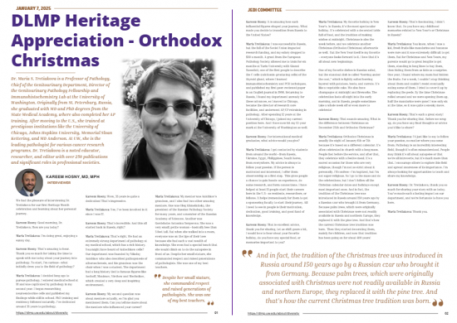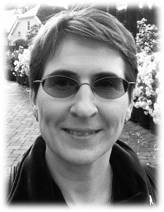DLMP Heritage Appreciation - Orthodox Christmas
January 7, 2025
View this article as a PDF here.

Interview by Kareem Hosny, MD, MPH
We had the pleasure of interviewing Dr. Tretiakova for our first Heritage Month celebration and learning about her personal journey.
Dr. Maria S. Tretiakova is a Professor of Pathology, Chief of the Genitourinary Department, Director of the Genitourinary Pathology Fellowship and Immunohistochemistry Lab at the University of Washington. Originally from St. Petersburg, Russia, she graduated with MD and PhD degrees from the State Medical Academy, where she also completed her AP training. After moving to the U.S., she trained at prestigious institutions like the University of Chicago, Johns Hopkins University, Memorial Sloan Kettering, and MD Anderson. At UW, she is the leading pathologist for various cancer research programs. Dr. Tretiakova is a noted educator, researcher, and editor with over 250 publications and significant roles in professional societies.

Kareem Hosny: Good morning, Dr. Tretiakova. How are you today?
Maria Tretiakova: I'm doing great, enjoying a sunny day.
Kareem Hosny: That’s amazing to hear. Thank you so much for taking the time to speak with me today about your journey into pathology. To start, I’m curious—what initially drew you to the field of pathology?
Maria Tretiakova: I decided long ago to pursue pathology. I entered medical school at 16 and was captivated by pathology in my second year. I began researching neuroendocrine cells and published my findings while still in school. PhD training and residency followed naturally. I've dedicated around 35 years to pathology.
Kareem Hosny: Wow, 35 years is quite a dedication! That’s impressive.
Maria Tretiakova: Yes, I’ve been involved in it since I was 17.
Kareem Hosny: That’s incredible. And this all started back in Russia, right?
Maria Tretiakova: That’s right. We had an extremely strong department of pathology at my medical school, which has a rich history. You might have heard of Anitschkow cells? Our department was founded by Nikolay Anichkov who also described pathogenesis of atherosclerosis, and his grandson was the chair when I was a student. The department had a long history tied to famous figures like Aschoff, Maximov, Virchow and Mechnikov, which created a very deep and inspiring environment.
Kareem Hosny: My second question was about mentors actually, so I’m glad you mentioned them. Can you tell me more about the mentors who influenced your career?
Maria Tretiakova: My mentor was Anichkov’s grandson, and I also had two other amazing mentors. One was Oleg Khmelnitsky, the president of the Russian Pathology Society for many years, and a member of the Russian Academy of Sciences. Another was Gordeladze Antonina Sergeevna. She was a very small, petite woman—basically less than 5 feet tall. But when she walked into a room, everyone was on the tips of their toes because she had such a vast wealth of knowledge. She even had a special bench that she would climb on to do the autopsies in front of us. Despite her small stature, she commanded respect and raised generations of pathologists. She was one of my best teachers.
Kareem Hosny: It is amazing how such influential figures shaped your journey. What made you decide to transition from Russia to the United States?
Maria Tretiakova: I was successful in Russia, but the fall of the Soviet Union impacted research funding, and my salary dropped to $50 a month. A grant from the European Pathology Society allowed me to train for six months at Turin University with Gianni Bussolati, one of the first people to describe the C cells (calcitonin-producing cells) of the thyroid gland, where I learned immunohistochemistry and PCR techniques, and published my first peer-reviewed paper in an English journal in 1998. Returning to Russia, I found my department unready for these advances, so I moved to Chicago, became the director of research core facilities, and underwent AP/CP retraining in pathology. After spending 12 years at the University of Chicago, I joined my current position here. And I have now hit my 12-year mark at the University of Washington as well.
Kareem Hosny: For international medical graduates, what advice would you give?
Maria Tretiakova: I get contacted by students from around the world—from Russia, Ukraine, Egypt, Philippines, South Korea, from everywhere. My advice is always to follow your passion. If the person is motivated and interested, I offer them observership as a first step. This gives people a chance to gain hands-on experience, do some research, and form connections. I have helped at least 15 people start their careers here in the U.S--as residents, researchers, or fellows. It helps tremendously for them to get a sponsoring faculty to start their journey. All I need to see in people is their motivation, dedication, good training, and good fund of knowledge.
Kareem Hosny: That is excellent advice, thank you for sharing. Let us shift gears a bit, I would love to hear about your favorite holiday, do you have any special food, or memories important to you?
Maria Tretiakova: My favorite holiday is New Year’s. In Russia, it’s the most spectacular holiday. It’s celebrated with a decorated table full of food, and the tradition of making wishes at midnight. Christmas is also the week before, and we celebrate another Christmas (Orthodox Christmas) afterwards as well. But the New Year itself is my favorite – everyone looks forward to it. I love that it’s all about new beginnings. One of my favorite dishes is Russian salad, but the standout dish is called “herring under the coat,” which is lightly salted herring layered with potatoes, beets, and carrots. It’s like a vegetable cake. We also have champagne at midnight and fireworks. The celebration lasts all night into the early morning, and in Russia, people sometimes take a whole week off or even more to celebrate!
Kareem Hosny: That sounds amazing. What is the difference between Christmas on December 25th and Orthodox Christmas?
Maria Tretiakova: Orthodox Christmas is usually the night of January 6th or 7th because it’s based on a different calendar. It's often celebrated in church with a long mass. People fast before the service, and after that, they celebrate with a festive meal. It’s a sacred occasion for those who are very religious, though I’m not as strict about it personally. I’ll confess—I’m baptized, but I'm not super religious. So I go to the mass and do the celebrations, but I don't follow all the Christian calendar dates and holidays except most important ones. And in fact, the tradition of the Christmas tree was introduced in Russia around 150 years ago by a Russian czar who brought it from Germany. Because palm trees, which were originally associated with Christmas were not readily available in Russia and northern Europe, they replaced it with the pine tree. And that’s how the current Christmas tree tradition was born. Then they started decorating them, mainly for children, and now that tradition has been going on for about 400 years!
Kareem Hosny: That’s fascinating, I didn’t know that. Do you have any childhood memories related to New Year’s or Christmas in Russia?
Maria Tretiakova: You know, when I was a kid, fresh fruits like mandarins and bananas were rare and it was extremely difficult to get them. But for Christmas and New Years, my parents would go to great lengths to get them, standing in long lines to buy them, then hiding them from us kids as a surprise. One year, I found where my mom had hidden the fruits. For a week, I couldn’t stop thinking about them and couldn’t resist eventually eating some of them. I tried to cover it up by replacing the peels. By the time Christmas rolled around and we were opening them up, half the mandarins were gone! I was only six at the time, so it was quite a sneaky move.
Kareem Hosny: That’s such a great story! Thank you for sharing that. Before we wrap up, do you have any final thoughts or advice you’d like to share?
Maria Tretiakova: I’d just like to say to follow your passion, no matter where you come from. Pathology is an incredibly interesting field, though it’s often misunderstood. People may think it’s all about autopsies or that we’re all introverts, but it’s much more than that. I encourage others to explore this field and spread awareness of its importance. I’m always looking for opportunities to teach and share my knowledge.
Kareem Hosny: Dr. Tretiakova, thank you so much for sharing your story with us today. You’ve made such a lasting impact on our department, and we’re fortunate to have you here.
Maria Tretiakova: Thank you.
